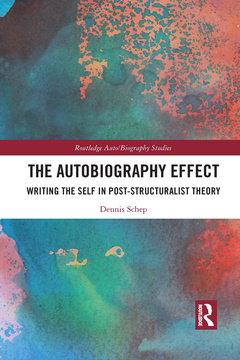Description
The Autobiography Effect
Writing the Self in Post-Structuralist Theory
Routledge Auto/Biography Studies Series
Language: English
Subjects for The Autobiography Effect:
Keywords
Young Man; Ni La; autobiography; La Carte Postale; literary language; Roland Barthes Par Roland Barthes; post-structuralism; Algerian Jewry; De Ce; Zohra Drif; Tristes Tropiques; Avital Ronell; Nancy’s Text; Weil Er; La Photographie; Camera Obscura; De Man; Ecce Homo; Barthes’s Mother; Autobiographical Subject
Publication date: 06-2021
· 15.2x22.9 cm · Paperback
Publication date: 07-2019
· 15.2x22.9 cm · Hardback
Description
/li>Contents
/li>Biography
/li>
Since the advent of post-structuralism, various authors have problematized the modern conception of autobiography by questioning the status of authorship and interrogating the relation between language and reality. Yet even after making autobiography into a theoretical problem, many of these authors ended up writing about themselves. This paradox stands at the center of this wide-ranging study of the form and function of autobiography in the work of authors who have distanced themselves from its modern instantiation. Discussing Roland Barthes, Jacques Derrida, Hélène Cixous and others, this book grapples with the question of what it means to write the self when the self is understood as an effect of writing. Combining close reading, intellectual history and literary theory, The Autobiography Effect traces how precisely its theoretically problematic nature made autobiography into a central scene for the negotiation of philosophical positions and anxieties after structuralism.
Preface
Chapter One: The Subject of Autobiography
Barthes’ anti-authorialism
Copyright and authorship
Barthesian autobiography
Return of the referent
The autobiography effect
Notes
Bibliography
Chapter Two: Bodies in Crisis
Pathography
Metaphor (Nancy)
Contingency (Nietzsche)
Interruption (Ronell)
Notes
Bibliography
Chapter Three: Eye Problems
Anthropology (Nietzsche)
Alterity (Derrida)
I (Cixous)
Notes
Bibliography
Chapter Four: Origin Algeria
Silence
Breaking the silence
Discursive proliferation
L’Allégorie française
Notes
Bibliography
Chapter Five: How Not to Write about Oneself
Lack of identity (Lévi-Strauss)
Posthumous rereadings (de Man)
The ecstasy of anonymity (Foucault)
Conclusions
Notes
Bibliography
Dennis Schep is the author of Drugs; Rhetoric of Fantasy, Addiction to Truth (Atropos Press, 2011), and of many academic and journalistic articles. He received his PhD in literary studies at the Humboldt University of Berlin in 2017. His current focus is on the establishment of the Foundry, a residency for intellectuals and artists in rural Galicia.
These books may interest you

Autobiographics in Freud and Derrida 160.25 €



